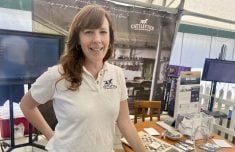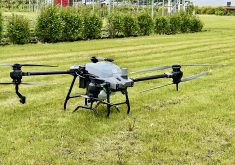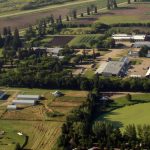“It’s the numbers behind it all. It’s important to get to know them a lot better, especially now.”
— Jay Peterson
Jay Peterson is used to the questions. In fact, he’s been asked so often, he’s got his lines memorized.
“I tell people that I’ve been farming in the field since I was 13 — I already know how to do that pretty well,” Peterson says.
At 26, Peterson is just starting out on his farming career near Frontier in southwest Saskatchewan. When he looks around him, it seems like his town is aptly named. In fact, it feels like all of agriculture is at a new frontier, where new skills and new talents will determine who will survive and prosper.
Read Also

Producers aren’t panicking over tariffs and trade threats
The Manitoba Canola Growers Association (MCGA) surveyed its members this spring to get a sense of how trade uncertainty was…
It’s why Peterson went to university, like an increasing number of young farmers. And in his case, it’s why he majored in the University of Saskatchewan’s newest agriculture program — a B. Sc. in agribusiness — instead of crop or animal science.
So he knows why people are curious. Agribusiness grads usually aim for a plush leather chair in a corner office, not a tractor seat.
For Peterson, though, there wasn’t any confusion about his objectives. It was a calculated, deliberate decision.
“It’s the numbers behind it all,” Peterson explains. “It’s important to get to know them a lot better, especially now.”
It’s also, he says, because business advice can be the hardest advice to get.
Peterson believes it’s a fact of farming that he will need to keep up to the minute on the latest developments in new products and production techniques. Still, there are ample resources available to help him do just that. What’s not so readily available is the business knowledge that the farmers of today and tomorrow are likely to need.
“If you need information about a chemical, say, you can just call your chemical rep,” Peterson says. “If I want to do a business feasibility study, on the other hand, I’d have to hire someone who has the training and knowledge I have — and that would cost a lot of money.”
Half a country to the east in rural Ontario, Dwayne Miller tells a similar story. He graduated from the Ontario Agriculture College (OAC) diploma program in 2000. Over the past several years he’s applied the skills he’s learned at school to his family’s diversified operation near Jarvis, where they grow grain and run a feedlot and cow-calf operation.
“In these days of tight margins and high risk, you really need to know the business side of the operation,” Miller told COUNTRY GUIDE during a recent break from harvesting corn.
Miller foresees a future industry where smart management decisions will be ever more important. Production will still be the heart of any farm, but success won’t be possible without core business skills.
Like Peterson, he says he must be able to make informed business decisions,
“I’ve wound up having a few business deals with people I went to school with.”
— Dwayne Miller
evaluate contracts and just generally manage their businesses more effectively.
“These days I’d say you have to be fairly proficient at paperwork,” Peterson says. “I’m not saying it’s something you can’t learn [on your own], but if you get an education in it you’ll understand the language [of business] a lot better.”
As these new graduates return to the farm, their book-learning comes face to face with practical farm challenges in the field and office — and occasionally some skepticism from some of the older members of the farm operation, who may have learned their skills through rigorous on-the-job training.
Peterson cautions new farmers that joining an established operation with a newly minted diploma or degree won’t automatically translate into acceptance. That’s something they must earn, just like any junior employee joining any existing business.
“It’s human nature,” Peterson says. “People get set in their own way of doing things — maybe even a bit more on a farm.”
Miller agrees it can be a challenge, and then quickly adds that it might not be a bad thing for older and more experienced members of the operation to bring a new member on slowly.
“If you’re 20 years old, you’re just not mature enough,” Miller explains. “You’re maturing, but you’re not as mature as a 30-or 35-year old would be. I’ve been back for eight years and it’s only in the past couple of years that I’ve really taken a bit more responsibility for the management decisions.”
Miller and Peterson say working hard and earning the trust of existing members of the operation is the only reasonable path forward.
Peterson cites his own experience on















